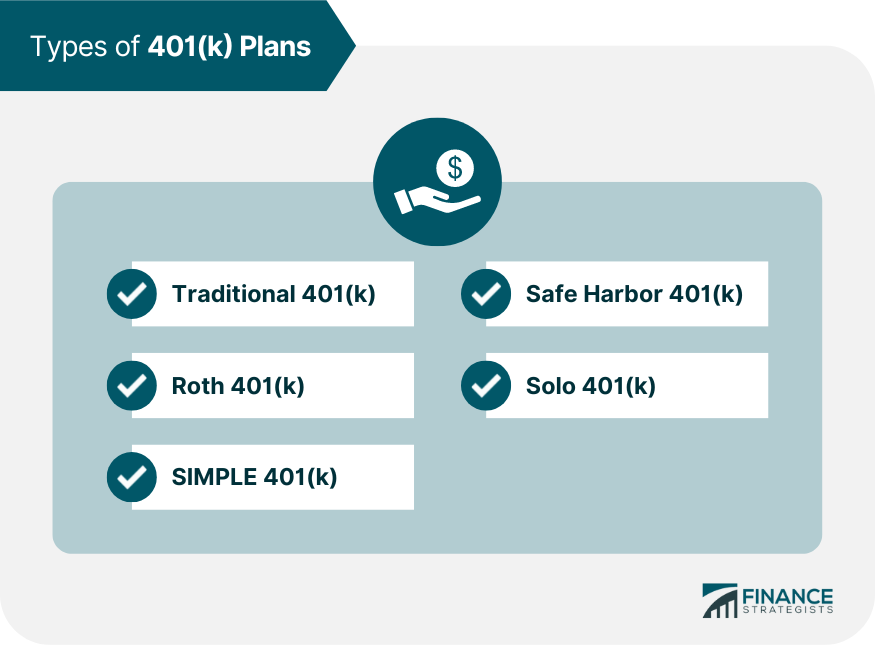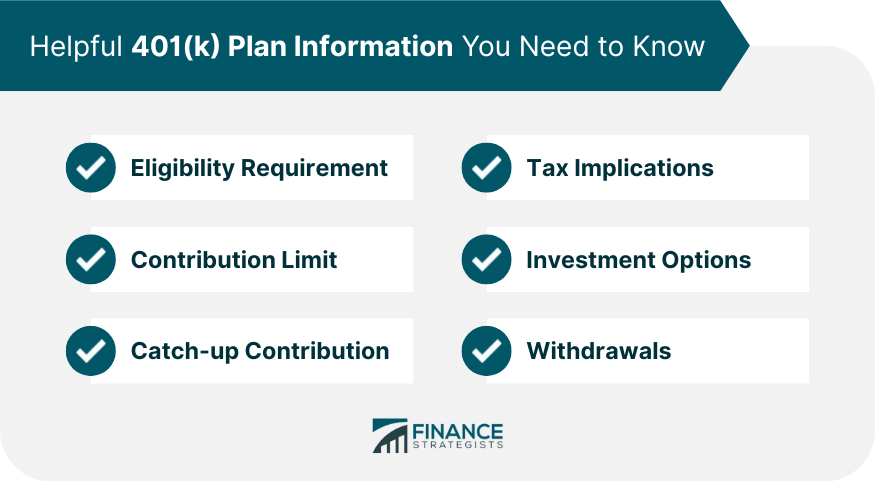A 401(k) plan is a type of employer-sponsored retirement savings account that allows employees to set aside tax-deferred contributions and receive matching contributions from the employer. The earnings on these deposits are not subject to federal and state income taxes until they are withdrawn, which typically occurs upon retirement. There are several different types of 401(k) plans that individuals may choose to participate in depending on their personal financial needs and goals. A traditional 401(k) plan is an employer-sponsored retirement savings plan that allows employees to contribute pre-tax dollars from their wages into the plan. Contributions are deducted from an employee's paycheck before taxes are calculated, meaning they are not subject to federal or state taxes and can help minimize a person's current tax liability. This type of plan also offers matching contributions made by an employer, potentially resulting in greater retirement savings. A roth 401(k) plan operates similarly to a roth IRA and allows for after-tax contributions, which can be withdrawn tax-free after reaching retirement age. The advantage of this type of plan is that it offers more flexibility for those who have the desire to withdraw funds from the account before reaching retirement age without incurring any penalties or taxes. A SIMPLE 401(k) plan is a type of retirement plan for small businesses and self-employed individuals. It is an employer-sponsored plan that allows employees to contribute from their wages in a tax-deferred way, similar to a traditional 401(k), but with lower contribution limits and simpler administrative requirements. Employers must also make matching contributions to the plan, up to 3% of each employee's salary, or more if desired. The unique aspect of the safe harbor 401(k) is that it requires employers to make either matching or non-elective contributions on behalf of their employees. This provision helps businesses avoid IRS testing and penalties, while still providing an attractive retirement savings vehicle for employees. Solo 401(k)s are similar to traditional 401(k)s, but they are only available for self-employed individuals with no staff or employees other than themselves or their spouse. These plans offer the same potential tax savings as traditional 401(k)s but do not require the same level of employer setup and maintenance associated with other types of plans. In order to make the most of this type of plan, it’s important to understand the eligibility requirements, contribution limits, catch-up contributions, tax implications, investment options, and rules governing withdrawals. To participate in a 401(k) plan, you must be employed by an employer who offers one and meet their specified criteria for eligibility. This varies depending on the employer but typically includes age and length of service with the company. The amount an individual may contribute to their 401(k) plan is limited by IRS regulations. For 2024, this limit is $23,000 for those under the age of 50. An additional $7,500 catch-up contribution is for those 50 or over, raising the employee contribution limit to $30,500. Individuals 50 or older can contribute additional funds beyond the annual limit - up to $7,500 in 2024 - through what are known as “catch-up contributions.” This is a great way to boost your retirement savings if you feel you may have fallen behind in your savings goals due to lifestyle changes or other circumstances. Funds contributed into a 401(k) plan are not taxed until they are withdrawn at retirement age. However, if withdrawals are taken prior to meeting certain conditions (such as reaching age 59 1/2), there may be taxes and penalties associated with withdrawal that would need to be accounted for accordingly. Depending on the type of plan offered by your employer, there may be a variety of different investments available within the 401(k). These could range from stocks and bonds, mutual funds and ETFs, target date funds based on when you hope to retire, and more. It’s essential to do some research before settling on any particular investment since each carries its own risks and rewards associated with them, as well as fees that should be weighed against potential returns prior to making any selections. Generally speaking, it’s best practice not to touch any assets held in your 401(k) until retirement age. However, if needed earlier than that, there may be certain exceptions available depending on individual life circumstances, such as disability or death of a spouse/child which allow withdrawals without penalty even prior to reaching retirement age. When it comes to choosing the right 401(k) plan for your retirement needs, the most crucial step is to do your research - and there are many resources available to help you with that. Most likely, they will have specific details about the type of plan they offer and any eligibility requirements, contribution limits, or other information surrounding their particular plan. The Internal Revenue Service has detailed information on retirement plans available on its website, including a section specifically dedicated to 401(k)s which outlines all applicable tax rules, regulations, and forms related to them. Certified financial advisors can provide helpful advice and assistance when selecting a plan that meets your individual needs, as well as provide guidance regarding how best to invest funds once contributions have been made into account. Companies such as Fidelity or Vanguard offer various types of retirement plans as well including 401(k)s. Their websites can provide insights into different types available, fees associated with each type, their respective investment options, and more. When it comes to planning for your financial future, a 401(k) plan can be a great way to save for retirement. However, selecting the right plan is a significant process, and it's essential to do your research in order to make the most of this type of plan. By taking advantage of the many resources available – from employers and financial advisors to news outlets and retirement plan providers – you can learn all about 401(k) eligibility requirements, tax implications, investment options, and rules governing withdrawals. With the right information and planning, you can create a strong foundation for achieving your financial goals in the years ahead.What Is a 401(k) Plan?
Have questions about 401(k) Plans? Click here.Types of 401(k) Plans

Traditional 401(k)
Roth 401(k)
SIMPLE 401(k)
Safe Harbor 401(k)
Solo 401(k)
Helpful 401(k) Plan Information You Need to Know

Eligibility Requirement
Contribution Limit
Catch-up Contribution
Tax Implications
Investment Options
Withdrawals
Where to Obtain 401(k) Plan Information
Your Employer
The IRS Website
Financial Advisors/Consultants
Retirement Plan Providers
Conclusion
401(k) Plan Information FAQs
A 401(k) plan offers tax-deferred savings with potential matching contributions from your employer, as well as a wide range of investment options and the ability to access your funds once you reach retirement age.
Contributions to a 401(k) are made directly from your paycheck on a pre-tax basis, and these funds can be invested in various types of financial securities such as stocks, bonds, mutual funds, and index funds. The money that is earned from these investments grows tax-free until it is withdrawn when the participant retires.
Generally speaking, any employee who works for an eligible employer may participate in a 401(k). Eligible employers are typically businesses that have staff with more than five employees and must offer their employees at least one investment option among other criteria set by the IRS.
The money you have accumulated in your 401(k) remains yours even if you change jobs or leave the company, though you may face certain penalties if you withdraw before age 59 1/2. You can transfer the balance to another retirement account or keep it with your former employer's plan administrator depending on their policies.
Yes. Setting up automatic contributions helps ensure that you're saving regularly and makes it easier for you to stay disciplined about investing for retirement — something that is essential for reaching long-term financial goals. Additionally, many employers will match some portion of employees' contributions which can help maximize returns over time.
True Tamplin is a published author, public speaker, CEO of UpDigital, and founder of Finance Strategists.
True is a Certified Educator in Personal Finance (CEPF®), author of The Handy Financial Ratios Guide, a member of the Society for Advancing Business Editing and Writing, contributes to his financial education site, Finance Strategists, and has spoken to various financial communities such as the CFA Institute, as well as university students like his Alma mater, Biola University, where he received a bachelor of science in business and data analytics.
To learn more about True, visit his personal website or view his author profiles on Amazon, Nasdaq and Forbes.













